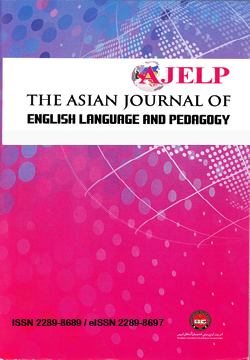A comparative study between Harriet Beecher Stowe’s Uncle Tom’s Cabin and Zhang Ailing’s love in a fallen city
DOI:
https://doi.org/10.37134/ajelp.vol11.1.7.2023Keywords:
Harriet Beecher Stowe, Love in a Fallen City, Uncle Tom’s Cabin, Zhang AilingAbstract
Harriet Beecher Stowe and Zhang Ailing are two renowned female writers who enjoy highly comments in the history of female feminism literature. They are writing from their own experiences and female perspectives to awaken the females and common people to pursue personal happiness and freedom. Besides, they advocated to transfer feminist ideas into daily behaviors. Harriet Beecher Stowe’s advocation of abolishing slavery promoted the large-scale social thinking, echoing the abolition movements in Britain and France. Her feminist ideas not only broke the shackles from being male’s attachments of females, but also changing the weak and fragile images of females. What’s more important, she led the American society to rethink about slavery and female position. However, the Chinese female writer, Zhang Ailing, as one of the “Four Female Talents “her feminist ideas are still restricted to be a fancier attachment to males. The ultimate goal of females’ fighting and calculating lays on male for financial support again. From her masterpiece, Love in a Fallen City, the heroine still puts great efforts on entertaining males for material’s sake. From the spiritual level, females are still inferior to males, even with the strong and harsh words in the novel. The feminist ideas of Zhang Ailing represented the conflict and struggle of Chinese females of that era between feudal thoughts and modern thinkings. This essay explores the two female writers’ feminist ideas on comparative literary criticism. The similarities and differences between them were also identified through comparison between feminist ideas and leading figures of the novels.
Downloads
References
Ammons, Elizabeth. (1977). Heroines in Uncle Tom’s Cabin. American Literature. p161-179.
Anderson, Beatrice. (1991). Uncle Tom: A Hero at Last. American.
Bressler Charles E. ( 2007). Literary Criticism, An Introduction of Theory and Practice. Prentice Hall, p168-180.
Bojovschi, I. (2020). Tradition and Modernity in Zhang Ailing’s Short Stories. Studia Universitatis Babes-Bolyai-Philologia, 65(1), p181-202.
Delmar, R. (2018). What is feminism? In Theorizing Feminism. Routledge. p. 5-28.
D'ignazio, C., & Klein, L. F. (2023). Data feminism. MIT Press. p6.
Fu Lei, (2010), Fu Lei Collected Works, Jiang Su Art Press, p238
Harriet Beecher Stowe. (2005). Uncle Tom’s Cabin, Shang Hai:The Phoneix Press.
Kong, Y.J. (2008). Common But Unique, Intelligence, 1 (3), p47-49.
Ma,X.R. (2013). The Construction And Deconstruction of Racial Relationship in Uncle Tom’s Cabin, Modern Chinese Literature, p132-135.
Raina, J. A. (2017). Feminism: An Overview. International Journal of Research, 4(13), 3372-3376.
Shou, J.X(2007). The Revolution in Female Literature, Beijing: Chinese Social Science Press.
Harriet Beecher Stowe. (2017). Uncle Tom’s Cabin: Or, Life Among the Lowly. Tianjin People's Publishing House.
Su,H. (2020). Comparative Literature and World Literature Theory and Method Research and Chinese Discourse Construction. Huazhong Academic, (04),1-10. doi:CNKI:SUN:HZXS.0.2020-04-001.
Swirsky, J. M., & Angelone, D. J. (2016). Equality, Empowerment, and Choice: What Does Feminism Mean to Contemporary Women? Journal of Gender Studies, 25(4), 445-460.
Tran, T., Trinh, T. P. T., Le, C. M., Hoang, L. K., & Pham, H. H. (2020). Research as a Base for Sustainable Development of Universities: Using the Delphi Method to Explore Factors Affecting International Publishing Among Vietnamese Academic Staff. Sustainability, 12(8), 3449.
Yan, Q.C.(2020). A study of Zhang Ailing’s Novel "Love in a Fallen City" from a Feminist Perspective. Young Literary Writers,(20),30-31. doi:CNKI:SUN:QNWJ.0.2020-20-023.
Yuang,X.L (2005). Pandora’s Box, Shang Hai: Translation Publishing House.
Zhang, A’L. (2008)Love in a Fallen City . Beijing:The Writer Press.
Zhang, B.G. (2018). American Slavery Abolishment’s Reflection Into The Early West Movement. Foreign Language Studies ,39-44.
Zhao, K.J. (2015). Reread Uncle Tom’s Cabin, Literary Review, p4-6,
Zhang, L. (2023). Harmony and Development—The Acceptance and Influence of Woolf’s Feminist Literary Theory. Young Literary Writers,(08),152-154. doi:CNKI:SUN:QNWJ.0.2023-08-071.2023(08) .
Zhang, M.Y. (2016). An Analysis on American Discrimination in Literature , English and American Literature, 259-232.
Zhang, X.Y. (2021). Analysis on the Application of Comparative Literature Research Methods in European and American Literature Teaching. Journal of the Chinese Society of Education. 2021(02) ,140. doi:CNKI:SUN:ZJYX.0.2021-02-067.
Zhang, Y.X. (2008). The Humanity Experience of Zhang Ailing, Hainan: Journal of Hainan Radio & TV University, 3(5),89.
Downloads
Published
How to Cite
Issue
Section
License
Copyright (c) 2023 Shi Shaohua, Revathi Gopal, Muhamad Lothfi Zamri, Nunik Sugesti M.Hum

This work is licensed under a Creative Commons Attribution-NonCommercial-ShareAlike 4.0 International License.





